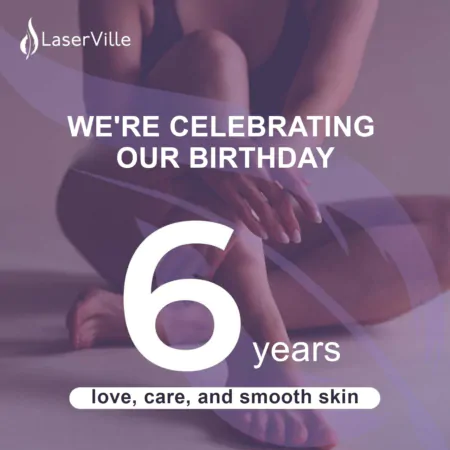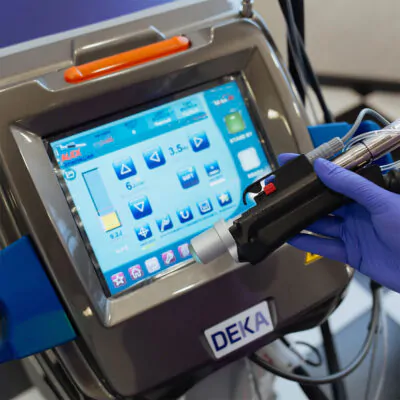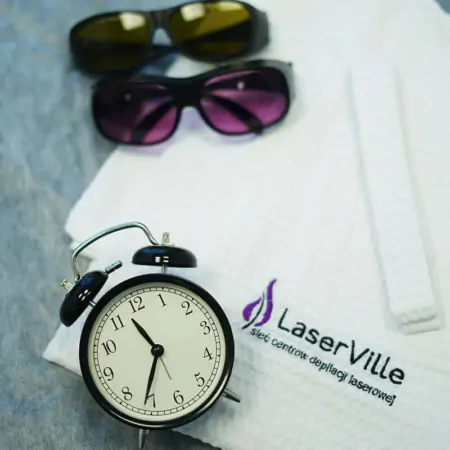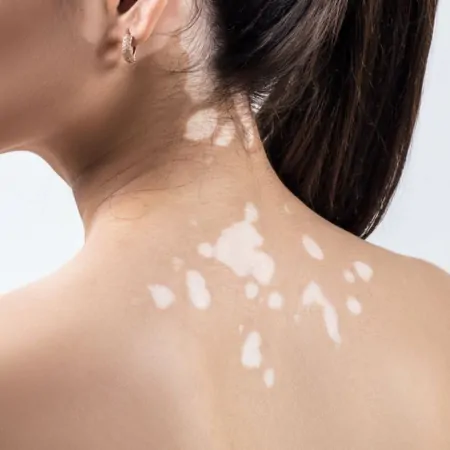Laser hair removal: contraindications and side effects
Contents
- ✨ Why are there contraindications to laser hair removal?
- ✨ Absolute contraindications to laser hair removal
- ✨ Relative contraindications to laser hair removal
- ✨ Side effects of laser hair removal when contraindications are ignored
- ✨ Normal effects after laser hair removal
- ✨ Can serious complications occur after laser hair removal?
- ✨ What complications can occur after laser hair removal?
- ✨ Contraindications during laser hair removal: conclusions

Are there contraindications for laser hair removal? Despite the effectiveness and safety of laser hair removal, this procedure has its limitations. There are clear contraindications to laser hair removal, and ignoring these factors can lead to unpleasant or even dangerous consequences.
It is important to understand that laser hair removal is a physiological intervention. That is why side effects of laser hair removal are possible even with proper performance of the procedure, and even more so if safety precautions are not followed. In this article we will consider relative and absolute contraindications to laser hair removal, as well as discuss potential side effects and complications after the procedure. Knowledge of these nuances will help you make a balanced decision and avoid negative consequences.
Important: the information in this article is for informational purposes only. In real practice, much depends on the type of laser, the qualification of the specialist, the protocols of a particular salon, as well as individual characteristics of the skin, hormonal background and phototype of the client. Before starting a course of procedures, it is recommended to consult a doctor (for example, a dermatologist or endocrinologist) and discuss the details with the laser hair removal specialist.
Why are there contraindications to laser hair removal?
Laser hair removal is considered one of the safest and most gentle aesthetic procedures. The technology has long been approved by the U.S. Food and Drug Administration (FDA), certified in EU countries, and used by millions of people around the world. However, even with such a level of trust from medicine, contraindications to laser hair removal are not bureaucracy, but a basic concern for safety. 
The principle of laser hair removal lies in the targeted destruction of hair follicles under the action of a focused light pulse. The beam penetrates the skin, is absorbed by melanin – the pigment contained in the hair – and is converted into heat. This heat destroys the follicle without affecting the surrounding tissues. However, it is important to take into account that everyone’s skin is different, hormonal levels vary, and even the equipment itself may differ – hence the contraindications to laser hair removal.
There are different types of lasers, among which the most popular are alexandrite, diode, and Nd:YAG. Each has its own wavelength, penetration depth, and level of impact on the skin. Contraindications to laser hair removal with an alexandrite laser may differ from the limitations when using a diode device. That is why, before the procedure, it is necessary to consider not only medical factors but also technical parameters: skin phototype, hair density and color, medication intake, activity of inflammatory processes, and even the presence of tattoos in the treatment area.
When it comes to laser hair removal, contraindications are conventionally divided into two types:
- Absolute – conditions under which laser hair removal is strictly not recommended due to the risk of serious consequences (for example, in cases of cancer, decompensated diabetes, or immune disorders).
- Relative – do not exclude the possibility of the procedure but require an individual approach and consultation with a doctor or specialist. For example, a recent tan, the use of photosensitizing medications, or breastfeeding are not always reasons to refuse the procedure but may affect the session parameters.
Knowledge of contraindications, a conscious approach to choosing the technology, and trust in professionals are the key conditions to ensure the procedure goes smoothly without negative consequences.

Absolute contraindications to laser hair removal
Absolute contraindications to laser hair removal are conditions under which the procedure is strictly prohibited due to the risk of serious complications. In such cases, laser exposure may not only prove ineffective but can also harm health.
Absolute contraindications include:
- oncological diseases;
- systemic autoimmune diseases and connective tissue disorders (for example, lupus erythematosus, scleroderma);
- diabetes mellitus in the decompensated stage;
- epilepsy and other seizure disorders;
- serious heart and vascular disorders (including varicose veins in the acute stage, thrombophlebitis, venous insufficiency);
- chronic diseases in the acute stage;
- infectious diseases accompanied by fever;
- acute inflammatory processes on the skin, including pustular eruptions, active herpes, and dermatoses;
- liver and kidney diseases with impaired function;
- blood clotting disorders, tendency to bleeding;
- pathological tendency to form keloid scars (more details in our article on laser hair removal and keloids);
- presence of pacemakers, metal implants, or prostheses in the area exposed to the laser;
- suspicious skin neoplasms in the epilation area;
- recent surgical intervention in the treatment area (less than 3 months ago);
- allergy to components used during the procedure.
Absolute contraindications to laser hair removal are not a reason to panic but rather a guideline to ensure the procedure is safe and predictable. If you have doubts about your health condition, be sure to consult a doctor before starting the course. In some cases, limitations can be bypassed by choosing an alternative treatment area or another hair removal technology.
 Relative contraindications to laser hair removal
Relative contraindications to laser hair removal
Relative contraindications to laser hair removal are conditions under which the procedure is not strictly prohibited but requires an individual approach, equipment parameter adjustments, or rescheduling of the session. Sometimes they call for prior consultation with a doctor or postponing the procedure until the body has fully recovered. Ignoring these factors may lead to side effects of laser hair removal or reduced effectiveness of the session.
Relative contraindications include:
- pregnancy and lactation – there is no confirmed harm, but procedures during this period are not recommended due to hormonal instability (more details in our article on whether laser hair removal is possible during pregnancy and breastfeeding);
- recent tanning or solarium use – increases the risk of pigmentation and burns;
- taking photosensitizing medications (for example, antibiotics from the tetracycline or fluoroquinolone groups);
- use of retinoids before laser hair removal – the skin becomes vulnerable to thermal damage;
- applying alcohol-based products, oils, or heavy creams to the skin 1–3 days before the procedure;
- fresh skin damage – scratches, burns, insect bites;
- skin procedures incompatible with laser hair removal in recent weeks (chemical peels, dermabrasion, photorejuvenation, botulinum toxin injections, hyaluronic acid, etc.);
- skin conditions in a mild stage, including psoriasis, eczema, acne;
- multiple moles or pigmented lesions in the treatment area;
- tattoos in the area of laser hair removal – treating the skin around tattoos is possible, but the tattoo itself is not affected;
- recent plucking of hair before laser hair removal (sugaring, waxing, epilator) – laser treatment is only effective on hairs in the active growth phase;
- increased skin sensitivity or tendency to irritation – requires special adjustment of laser parameters;
- hormonal fluctuations or taking hormonal medications – may affect hair growth and the outcome of the procedure.
These conditions do not necessarily mean a refusal of the procedure – rather, they require a conscious approach and adherence to safety measures. An experienced specialist with access to modern equipment will be able to adapt the laser parameters to the client’s individual characteristics and avoid negative consequences of laser hair removal. Therefore, in the presence of relative contraindications, it is especially important to undergo a consultation before the session and not to hide information about your condition.
Side effects of laser hair removal when contraindications are ignored
Modern laser hair removal is undoubtedly a safe procedure. But only under one condition: if all contraindications are taken into account. When a client hides information about taking medications, recent injections, or chronic illnesses, and the specialist does not conduct a proper consultation – that is when real side effects of laser hair removal can occur. In such cases, the following reactions are possible:
| Potential Effect | Possible Cause | How to Prevent |
| Skin burn | Procedure on tanned skin, applied cream with retinol, increased photosensitivity due to medication | Avoid sessions with recent tan or while taking photosensitizers |
| Pigmentation after laser hair removal | Ignoring prohibition of laser treatment on fresh tan, inflamed skin | Postpone the procedure until the skin has recovered |
| Folliculitis (inflammation of hair follicles) | Excessive sweating, laser treatment against the background of infection or inflammation | Inform the specialist and temporarily postpone the procedure |
| Severe irritation and itching after laser hair removal | Skin is too sensitive, individual characteristics not taken into account | Use gentle settings and an alternative approach |
| Exacerbation of chronic disease | Procedure performed during a period of instability in the body (for example, on the background of autoimmune flare-up) | Obtain doctor’s approval before scheduling hair removal |
It is important to understand: almost all serious side effects of laser hair removal occur not because of the laser itself, but due to neglecting contraindications – both on the client’s side and on the specialist’s side. That is why the consultation before the procedure must be honest and detailed. There is no need to fear canceling a session – it is far more important to avoid real complications after laser hair removal.
 Normal effects after laser hair removal
Normal effects after laser hair removal
Much has been written about the advantages of laser hair removal. It is indeed an effective method: it helps get rid of unwanted hair for a long time, reduces the risk of ingrown hairs, saves time, and is suitable for sensitive skin. However, even the most advanced method has its drawbacks. In this section, we will focus on typical and normal body reactions that may occur after the procedure and are not a cause for concern. Such effects after laser hair removal are rather a natural response of the skin to the thermal action of the laser. Among them:
- Mild redness and swelling of the skin in the laser hair removal area – a negative effect that is one of the most common reactions. This is normal: the hair follicles have received a thermal impulse and have started to break down.
- Tingling or burning sensations – especially in people with sensitive skin. Sometimes accompanied by mild itching. To avoid this, it is worth choosing the completely painless MOVEO technology.
- Follicular edema – tiny red dots at the hair growth site. They indicate that the laser “hit the target” – the follicles have been affected.
- Dryness or flaking of the skin – the result of temporary moisture loss. This can be restored with moisturizing cream or a panthenol-based gel.
- Skin sensitivity to touch or clothing – especially in areas with thin skin, such as the underarms or bikini. This feeling quickly passes.
These side effects of laser hair removal are temporary, harmless, and usually disappear within a few days. They can be compared to muscle soreness after a workout: it indicates that the body is working and adapting.
At the same time, it is important to remember: if side effects after laser hair removal go beyond the described reactions – such as severe burning, blisters, rashes, or persistent pigmentation – this is no longer normal. In such cases, you should definitely consult a specialist.
 Can serious complications occur after laser hair removal?
Can serious complications occur after laser hair removal?
Laser hair removal is a proven technology that has been used in aesthetic medicine for several decades. It has been approved in the USA, certified in EU countries, and, when protocols are followed, is considered one of the safest procedures in cosmetology. However, the word “safe” does not mean “guaranteed without consequences under any circumstances.” Complications after laser hair removal are possible, but they are very rare – most often in cases of gross violations by the specialist or neglect of contraindications by the client. Below are the key risk factors:
- Unsuitable equipment or incorrect settings. If an outdated laser is used or the parameters are chosen incorrectly, this can lead to burns, hyperpigmentation, or scarring – especially in people with dark or sensitive skin.
- Lack of proper training of the specialist. The deeper the specialist’s knowledge, the lower the likelihood of complications. Without proper diagnostics and understanding of laser mechanisms, even the most expensive device can cause harm.
- Neglecting contraindications. For example, performing the procedure in the presence of inflammation, herpes flare-ups, while taking photosensitizing medications, or in the first days after tanning – this is a direct path to complications. Moreover, the consequences do not always appear immediately.
- Ignoring post-procedure care rules. Even if everything went perfectly, neglecting simple measures – such as applying alcohol-based products, visiting a solarium, or mechanically irritating the skin – can disrupt recovery and cause inflammation or hyperpigmentation.
 What complications can occur after laser hair removal?
What complications can occur after laser hair removal?
Among the potential complications are burns during laser hair removal, prolonged inflammation, pigmentation disorders (appearance of light or dark spots), secondary infection, activation of the herpes virus, and scarring in people prone to keloid formation. These reactions are considered normal and require consultation with a dermatologist.
All these complications after laser hair removal are predictable and manageable. They can be avoided if you:
- undergo a complete and honest consultation before the procedure;
- choose a qualified specialist;
- use certified equipment;
- strictly follow aftercare recommendations.
In other words, serious consequences after laser hair removal are not the result of the technology itself, but the outcome of specific mistakes. And the more responsible the approach, the higher the safety.
Contraindications during laser hair removal: conclusions
Laser hair removal is a technology that combines effectiveness with a high level of safety. But it works on the body, not in a vacuum. That is why it is important to consider not only skin and hair type, but also health condition, medication intake, recent procedures, and even body care habits.
When it comes to laser hair removal, contraindications can be absolute (when the procedure is impossible) and relative (requiring specialist consultation). Ignoring these factors can lead to side effects and complications, while a thoughtful approach allows risks to be avoided.
If you choose a professional specialist, attend consultations, and follow recommendations – laser hair removal becomes not only effective but also as safe as possible.































No reviews